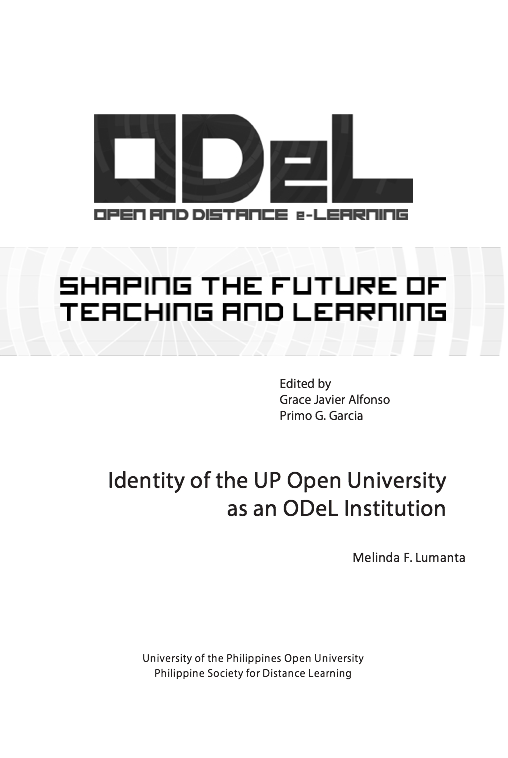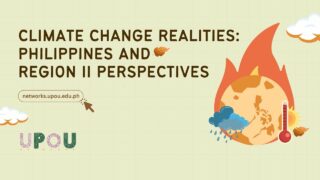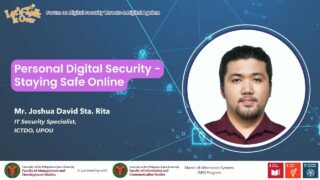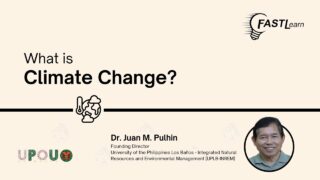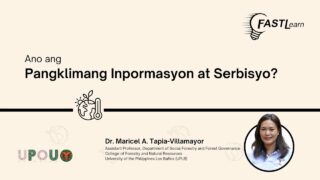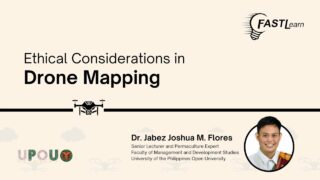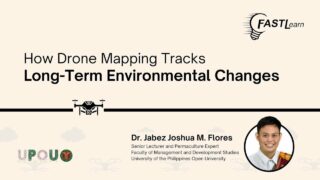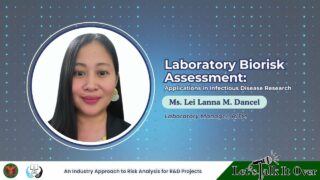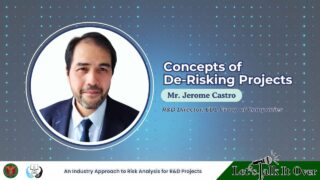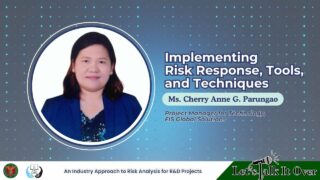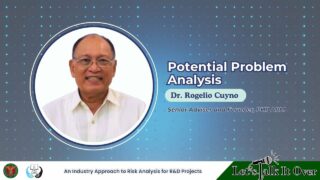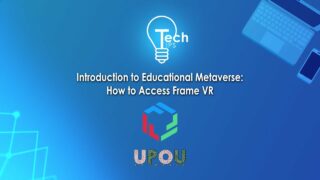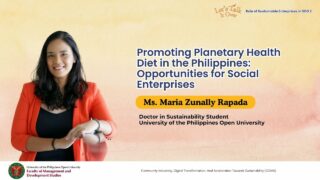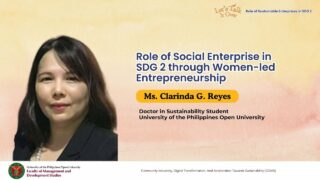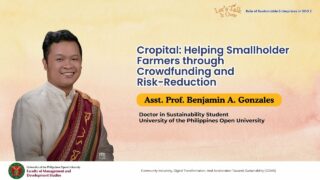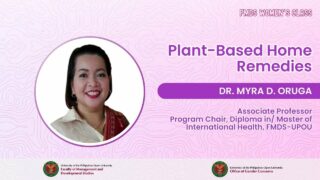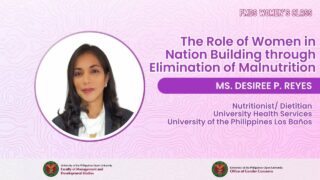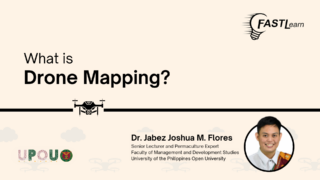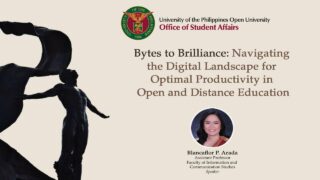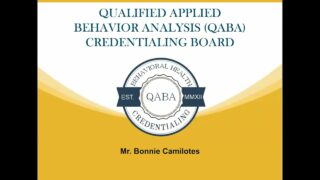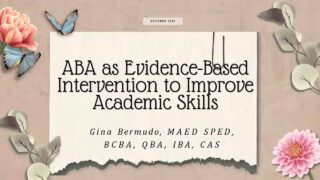As early as 2001, we boldly declared “UPOU goes online.” The move proved to be a game changer as it did not mean simply switching the course delivery system of the UPOpen University (UPOU); it meant redefining and realigning critical functions of the university that affected the way we did things and the way we viewed ourselves as an academic institution. What then is UPOU and who are we?
As Van der Walt (2007) observed, identities of educational institutions, in most instances, seem to form spontaneously with no conscious effort to define its identity at the outset. Rather, institutional identity is developed as individuals, forming the totality of the institution, collectively negotiate successful behaviors in meeting the challenges in its environment.
In UPOU going online was the tipping point which triggered the institution’s behaviors as revealed in major activities and undertakings. Hence, by looking at the university’s accomplishments through the years, one gets a sense of UPOU’s identity as an ODeL institution. What we had been engaging in all this time, as an institution and even as individuals making up that institution, is reflective of who we are. This narrative provides glimpses of how we see ourselves behaving and responding to emerging trends and realities of a digital and networked society. It is an attempt to present UPOU activities that define certain themes or threads that make up the fabric of the UPOU identity.
Like most other educational institutions, UPOU found itself responding in deliberate and not so deliberate ways to challenges in its environment. An institutional document that heralded our accomplishments was put out in 2009. Intended to be an end-of-term institutional report it was creatively put together, providing a glimpse of ourselves as an agile organization adapting to the technological and pedagogical forces that presented themselves in a digital world and open education era.
For instance, in the area of teaching and learning, we were quick to innovate with the Resource-based Course Development (RBCD) strategy. This approach empowers learners by providing access to learning materials and deciding for themselves how these will help them in their own learning. It was a shift from the initial way we did things wherein faculty-in-charge prepared their course modules prior to offering the course. These materials served as the main learning resource of learners. “With online learning, however, course development and course delivery as separate and sequential processes became less distinct” (Lumanta & Lagaya, 2012). Further, Internet-based resources have become available to both students and teachers and along with the fact that the obsolescence of materials have been occurring at a faster pace and updating of print modules has become expensive, UPOU’s management deemed it practical to pilot the RBCD approach.
Hence, UPOU redefined its course development and delivery approach to include RBCD. Premised on a fundamental orientation wherein student and teacher are considered as co-creators of knowledge, the RBCD approach allows for greater flexibility in putting together course materials. In this approach, the faculty- in-charge, after preparing a course guide in which course goals are articulated, takes on a facilitation role through a process of referencing, compilation, integration, and synthesis of resource materials which the students can use, evaluate, and reuse in the learning process.
This learner-centered approach was taken to heart by UPOU faculty and staff. It is heartening to know the efforts exerted by faculties- in-charge and support offices in knowing who their learners are and how best to reach them. These experiences were not only given out as testimonials but also shared in fora through paper presentations in national and international conferences by UPOU faculty and staff.
In line with this orientation, a significant innovation adopted by UPOU was the creation of the Virtual Learning Center in recognition of the special needs and concerns of its “offshore” learners. The driving force behind this was the growing number of learners based abroad and the need to integrate them into the academic life in an open and distance e-learning (ODeL) environment. Needless to say, the attendant administrative and logistical support were likewise reviewed and adapted. Another instance of agility was UPOU’s ability to quickly shift gears because of its “smallness.”
In 2009, we seized the opportunity to announce to the world that we were going global. International collaboration with academic and other institutions were forged for various projects including course development, course offering, short-term training, and institutional assistance. For that year, the anniversary theme, “Building Global Learning Communities” captured the essence of our internationalization thrust.
We collaborated with Central Queensland University for the Land Valuation Management Program. We partnered with the World Health Organization for course development in international health and continued the contract with the e-Learning Development Initiative.
We forged linkages with five Asian Open Universities to develop and offer a graduate program in ASEAN Studies. It was a deliberate move as we anticipated the vital role an ODeL institution could play in the 2015 ASEAN integration. Offering courses online allowed the university to reach an international audience and bring global and regional issues before learners and communities of practice.
While our sight was set on the international arena, UPOU did not forget its commitment as a public service institution in the national scene. With teacher education being one of its main thrusts since its inception, UPOU focused its degree and nonformal programs on Filipino public school teachers because “teaching the teachers” allows us to reach Filipino learners through them. Through this, we kept to our commitment of providing lifelong learning for all.
With the burgeoning business process outsourcing (BPO) industry in the country, UPOU offered its expertise in developing online courses in service management. Similarly, with the continuous demand for qualified seafarers worldwide, UPOU committed itself to help in the professionalization of the maritime sector. With an ODeL framework UPOU believed it was in the best position to fast track and scale up the training of qualified talents to sustain its unrivaled position in the world as the BPO country of choice and the maritime industry’s supplier of marine engineers worldwide.
Under the leadership of the Faculties of Studies, UPOU pursued projects that helped elevate the level of teaching in public schools, that surfaced issues in the use of Information and Communication Technology (ICT) in education, that piloted local government- academe cooperation to bring the UP quality education even to underserved sectors of the country, that multiplied e-learning skills through capacity building courses, and that gave expert advice to policymaking bodies.
We are also a community of scholars continuously conceptualizing, debating and addressing the essence of what is distance learning, e-learning, openness, and online learning in various fora organized or participated in by UPOU officials, faculty, and staff. A colloquium series on distance education and the disciplines was held to foster critical reflection and dialogue on pedagogical and curricular innovations, research themes and approaches, disciplinal tensions and debates, and evolving perspectives in distance education.
Another academic exercise we held was a roundtable discussion on open educational resources (OER) and participation in the knowledge commons movement. This intended to provide a forum for critical reflection on policies, practices, and role of the university from multidisciplinary perspectives.
And in keeping with advances in education, a soul-searching series of discussions was held by UPOU faculty and staff to reflect on the basic question: “How open are open universities?” It explored the paths and trajectories the university has to travel, the pedagogies and strategies it has to employ to remain relevant and effective. In the following years, a research team ventured follow-up activities such as research teams.
In line with this academic debate and ongoing discourse, UPOU organized an international conference in 2014 aptly titled “Universities in an Era of Open Education.” As the 2nd international conference on open and distance e-learning (ICODeL), it intended to bring together academics, researchers, educators, administrators, policymakers, students, and other stakeholders to address educational challenges posed by a dynamic, technology-based, and continually changing environment.
It was in 2012 that the UPOU introduced the concept of open and distance e-learning (ODeL) by holding the first international conference on open and distance e-learning known as ICODeL. In this conference, UPOU proposed to explore spaces and possibilities for open, distance, and e-learning; the convergence of philosophies, pedagogies, and technologies; and the opportunities, issues, and challenges in the education and public sectors.
These were great strides we took because we believed we had a responsibility to articulate, innovate, initiate, and undertake these initiatives. I would like to believe that the things we have engaged in in the past years are reflective of who we are, thus defining our institutional identity. Our informed assessment of what is going on around us that allows us to be at the forefront results from an academic orientation in being part of the premier university in the Philippines. It follows too that our being reflective of what is good or not so good about developments in the field comes from a clear articulation of values we uphold as a university, among which are excellence, equity, humanism, and efficiency. In addition, we have, as an institution, come to own the “universitas ethos” which include academic excellence, intellectual pluralism, democracy, and cultural diversity. These enable us to elevate discourse to a conceptual level and to harness the spirit of experimentation, innovation, and evaluation of ODeL practices.
In essence, the ODeL institution we know as UPOU is all these— agile and responsive, arising from its being lean and mean; in tune with the times, if not ahead of its time; a community of scholars continuously enriching theory and practice of open and distance e-learning.
Lumanta, M. F. & Lagaya, M. P. (2012). UPOU Resource-based Course Materials development and delivery: A KM measurement of a DE innovation. ASEAN Journal of Distance Learning, 4, 1, 45-50.
Office the Vice Chancellor for Academic Affairs Report. (2012). UP Open University.
UPOU in the Digital Age. (2009). UP Open University.
Suggested citation:
Lumanta, M. F. (2014). Identity of the UP Open University as an ODeL Institution. In G. J. Alfonso, & P. G. Garcia (Eds.), Open and Distance eLearning: Shaping the Future of Teaching and Learning (pp. 15-20). Los Baños, Laguna, Philippines: UP Open University and Philippine Society for Distance Learning.
